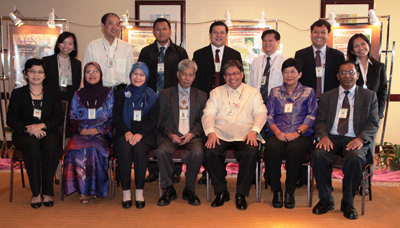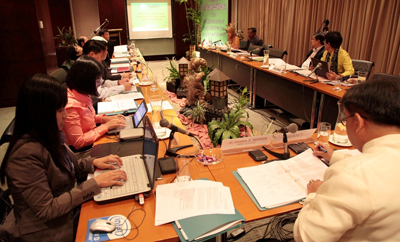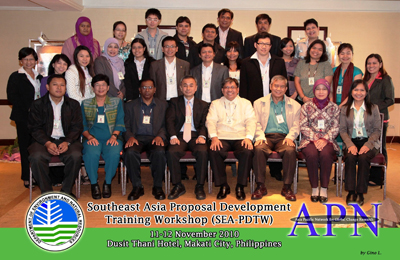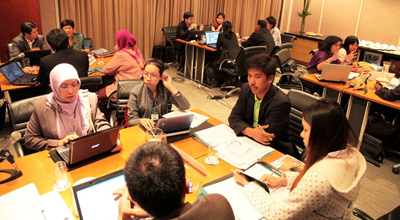The APN in cooperation with the Department of Environment and Natural Resources (DENR) of the Philippines through the Ecosystems Research and Development Bureau (ERDB) successfully convened the 3 rd Southeast Asia Sub-Regional Cooperation (SEA-SRC) Meeting back-to-back with the Proposal Development Training Workshop (PDTW) in Makati City, Philippines, on 9-12 November 2010.
3rd SEA-SRC Meeting
With full support and active participation of the APN members/delegates from SEA ( Cambodia, Indonesia, Lao People’s Democratic Republic, Malaysia, Philippines and Thailand), representatives from DENR-ERDB and APN Secretariat who attended in the Meeting, many fruitful outcomes resulted from the discussions in this two-day Meeting. It c ommenced with welcome remarks from, Mr. Eriberto C. Argete, the APN national Focal Point (nFP) for the Philippines and Director of the Planning and Policy Studies Office of DENR. Following this, Mr. Marcial C. Amaro, Jr., the Scientific Planning Group (SPG) Member for the Philippines and Director of ERDB officially opened the 3 rd SEA-SRC Meeting and further gave a short introduction. Dir. Amaro was nominated as Chair of the Meeting.
Ms. Perlyn Pulhin, Programme Officer for Communications and Development, APN Secretariat gave a brief presentation about the background of APN SRC, an update on SEA-SRCom issues and related activities to date and Meeting objectives. This was succeeded by a presentation on the highlights of the 2 nd SEA-SRC Meeting delivered by Dr. Subramaniam Moten, SPG Member for Malaysia and Head of Research Division, Malaysian Meteorological Department. In revisiting the discussions at the second Meeting, the SEA-SRCom was reminded of the SWOT (strengths, weaknesses, opportunities and threats) analysis. It was stressed that SEA-SRCom should look into how the strengths can be further enhanced and how the weaknesses could be addressed at the country and sub-regional levels.
The Item on ‘Country Reporting’ accommodated the presentations from the delegates of each of the SEA countries. Emerging research priorities, scientific trends and issues in the Southeast Asia sub-region with regard to global environmental change/climate change were discussed. New thematic areas and research gaps were identified and the group agreed on steps to be taken to address these gaps as well as how the plans and actions could be integrated into a regional effort.
Active discussion ensued under the Item on Institutional Policy on Data Access/Sharing and Management. Dr. Erna Adiningsih, SPG Member for Indonesia (SPG Co-Chair) and Director of Aerospace Analysis and Information Center, National Institute of Aeronautics and Space, Indonesia, facilitated the discussion based on the outcomes of the 16 th Steering Committee (SC) Meeting. A number of suggestions were solicited such as looking into the guidelines of other organisations and see how these can be duplicated or modified to suit APN needs and also exploring on the possibility of setting up a virtual database which seems to be the most feasible with the resources available in APN. This database should provide the public an access to all the data that have been generated from APN funds as well as the information on whom they can contact to access the data that are restricted for some regulatory or security reasons.
Discussion on the Institutional Policy on Reviewer Conflict of Interest (COI) was also introduced by Dr. Adiningsih. The SEA-SRCom Members are basically happy with the existing mechanism, the work to date on further strengthening the policy and the outcomes of the 16 th SC Meeting. While it was noted that it would be difficult to come up and consolidate an exhaustive list of relationship subjected to COI and compounded with the issue on the timeframe, the group managed to discuss a number of options that will be incorporated later in the document, in consultation with the SPG Co-Chairs.
The Meeting solicited inputs in devising the APN Operating Plan for the third strategic phase (2010-2015). The continuation of the focussed activities that were launched early this year was proposed under the medium- to long-term plan of the Science Agenda. Another suggestion for the Science Agenda is the implementation of calls for proposals in the following focussed areas:
- Integrated waste management in urban communities;
- Climate vulnerability and adaptation for agricultural-based community; and
- Community-based adaptation in the forest ecosystem focussing on biodiversity and sustainability
The above themes are ‘hot issues’ that were identified common to all countries in the sub-region. With the general and specific inputs from the Members for both the Science and Institutional Agendas, the SEA-SRCom expressed hope that a detailed Operating Plan would be ready for endorsement at the next APN Inter-Governmental Meeting (IGM)/SPG Meeting to be held in April 2011. It was noted that the more detailed the plan is, the better it could guide the APN Members in clearly outlining the tasks in the next five years, particularly their respective roles to effectively contribute in achieving APN goals.
Discussion ensued on actively engaging the members in strategic major events and APN-related activities happening in the country and the sub-region. SEA-SRCom Members are advised to maximise appropriate avenues to further increase the profile of APN in the region by displaying and disseminating materials, securing presentation or speaking slots, organising side-events and exhibits, and other networking strategies. The nFPs and SPG Members are committed to target the working groups of the Association of Southeast Asian Nations (ASEAN), high-level/ministerial meetings and appropriate national or international events in promoting the relevance of APN’s activities.
Keen on expanding the resources of APN and securing the current operating budget allotted to support regional research and capacity development activities, the SEA-SRCom Members shared their ideas on mobilising and diversifying APN funding resources, encouraging more financial and in-kind contributions from Members and strengthening the implementation of the Resources Development Strategy. It was emphasised that resources development is an area where strong cooperation among the nFPs, SPG Members, project leaders and collaborators is very important. This is to strategically package the outcomes or expected results from the projects that APN is supporting or has funded and present to potential donors how additional financial or in-kind support could improve the project implementation to produce better outputs beneficial for the country.
Despite the global economic depression, the APN budget for the current year increased with additional contributions from Japan and the Republic of Korea; thus the scientific activities have intensified with the donor’s generosity and continued support. The APN Coordinator, Ms. Kristine Garcia gave an update on the 2010 Annual Calls for Proposals which is currently on its review stage, the SPG and Capacity Development Committee (CDC) tasks ahead, some general observations on Calls for Proposals, and project management. The SPG Members who are very much involved in the review process and Ms. Garcia provided clarification on the queries from other delegates (alternate nFPs and SPG Members) not yet familiar on the mechanism.
Another important item on the science front that was discussed in the Meeting was devising criteria that define successful science-policy linkage(s). Suggestions were noted such as ‘when the project outcomes were used as basis in crafting of laws’ but i t is difficult to identify the most effective ways and robust criteria that can be used to define successful science-policy linkages(s) as approaches and strategies are different from one country to another. This challenge has to be continuously revisited in succeeding SRC meetings, at the next ad hoc meeting, and at the IGM/SPG Meeting.
The remaining items discussed future plans/activities including the 4 th SEA-SRC Meeting and strategies to enhance the flow of information and to identify mechanisms or communication channels towards improved relations among the nFPs, SPG Members, project leaders/collaborators, and global change partners in SEA. Deadlines on the submission of concept papers for future activities were set and issues that need immediate follow-up were noted.
Some delegates gave brief presentations on behalf of partner organisations: East-West Center University, Global Change Sys Tem for Analysis, Research and Training (START), and World Wildlife Fund. The presentations contained proposed activities that require strong partnerships in the region. The SEA-SRCom will closely communicate with each other and with partner organisations in pursuing collaborative activities with shared roles.
With the success of the two-day Meeting, the SEA-SRCom conveys earnest appreciation to the Chair, Mr. Amaro Jr., together with the staff of ERDB; the Philippines nFP, Mr. Argete representing DENR; and the APN Secretariat for the excellent hosting and preparations, smooth facilitation and efficient management of time during the Meeting, warm hospitality, and superb arrangements. The APN Secretariat extends sincere gratitude to all the participants and the ERDB Secretariat for realising a two-day fruitful Meeting. Now that there is clear direction and comprehensible steps have been laid to address the needs and fill the gaps in the global change research and capacity development undertaking in the region, the SEA-SRCom has a more important role to play in promoting and strengthening regional collaboration towards the attainment of APN goals.
SEA Proposal Development Training Workshop (PDTW)
First in the sub-region, the PDTW was a great success providing an opportunity for early-career scientists in the SEA to increase their capacity to submit a competitive proposal to APN for its Annual Calls for Proposals in key scientific areas for sustainable development in the Asia-Pacific region. The Workshop was also instrumental in putting APN one step forward in empowering the SPG Members who shared their knowledge on the APN proposal submission/review process and were exposed in the conduct of PDTW so they can impart the learning and experiences they gained to constituents, back in their home countries.
A perfect forum to discuss and exchange information on common global change issues and strengthen regional collaboration for scientific research, capacity development and policy-relevancy, the workshop was attended by 16 young scientists from SEA ( Cambodia, Indonesia, Lao People’s Democratic Republic, Malaysia, Philippines, Thailand, and Viet Nam ); SPG Alternate/Members for Indonesia, Lao People’s Democratic Republic, Malaysia, Philippines, and Thailand; Project Leader, Dr. Nestor Baguinon; and representatives from APN Secretariat and ERDB Secretariat.
The workshop began with opening and welcome remarks from Mr. Amaro, Jr. and APN Secretariat Director, Mr. Tetsuro Fujitsuka. Brief information about the APN was presented by Ms. Pulhin while Ms. Garcia discussed the workshop objectives and provided information on the selected outstanding APN-funded projects of the second phase evaluation and the Annual Calls for Proposals.
Dr. Baguinon, Professor in the University of the Philippines Los Baños, shared his experience in writing and developing a competitive proposal for the APN. He stressed on the relevance of strong regional collaboration and noted that a well-organised proposal team is basic to a successful research proposal application. A team of experts with different technical background needs levelling-off from the very start of writing the proposals so that targets/objectives are clearly set. Expected outcomes should be beneficial for both the APN and the proponents.
Scientific contribution and institutional support from collaborating organisations are also very important factors to consider in developing a strong proposal according to Dr. Baguinon. Exploring additional funding sources to support the project is an immediate task that the research team should be able to work out at the early stage. It is also crucial, Dr. Baguinon advised, that the team pay close attention on the initial feedback from the APN reviewers. An effective feedback mechanism in the case of his project was achieved through close communications with the APN Secretariat and the members of the research team, complementary consultations and mutual support among the participating institutions.
He concluded his presentation by sharing the lessons learned in the APN’s Calls for Proposals submission and review process. The title of his APN project is Collaborative Studies on Tropical Asia Dendrochronology, Addressing Challenges in Climatology and Forest Ecology with reference number ARCP2008-03CMY-Baguinon.
The presentation on guidelines and advice for proposal writing was given by Dr. Moten and the SPG Member for Thailand and Associate Professor in Chulalongkorn University, Dr. Jariya Boonjawat. From the perspective of a reviewer, Dr. Boonjawat stressed that there is high chance of being funded if the proposal has a good idea that is well expressed, gives a clear indication of methods for pursuing the idea and evaluating the findings, and provides well thought out plan for making the information known to intended readers. She enumerated helpful key questions to guide the early-career scientists on determining long-term research aims, preparing to do the research, and identifying potential funding sources.
Dr. Moten explained a number of reasons why APN declines a proposal. If it is due, however, to budgetary limitations keeping in mind that APN awards are highly competitive, proponents are strongly encouraged to resubmit in the next Calls for Proposals. Co-financing arrangements are necessary. The higher the matching fund, the stronger the proposal will be.
He noted that for the Annual Regional Call for Research Proposals (ARCP) in particular, the proponents should ensure the relevance of the project not only in a regional but also at a global scale. The proposals should also demonstrate strong links to the governments, stakeholders and policy-makers. He recommended the trainees to seek advice on the appropriateness of the proposal intended for submission for APN funding consideration by sending a letter of intent to the Secretariat.
Dr. Adiningsih presented on the roles of SPG Members and the nFPs in the APN proposals process. The SPG is mandated to review research proposals received by the APN, especially those in response to the Annual Calls for Proposals, and on the basis of this review, recommends to the IGMs the proposals for APN funding. The IGM, participated by nFPs of each member country, reviews and approves projects and activities to be undertaken or supported by the APN, based on recommendations made by the SPG.
An outline of the questions that SPG Members consider in the initial review process was explained by Dr. Adiningsih. She also specified the roles of the SPG Members in the review of proposals submitted under the ARCP and CAPaBLE (Scientific Building/Enhancement for Sustainable Development in Developing Countries) Programmes. She explained further each of the criteria in evaluating a proposal, the rating scale and the approval process. She advised the trainees to cro ss-reference with the criteria for eligibility and check if the proposal meets the criteria.
Following the five presentations was a ‘Question and Answer (Q&A)’ Session. The trainees had the opportunity to clarify with the invited speakers those vague points and other issues that were not covered in the presentations. Before the end of the morning session, Ms. Garcia explained the procedures of the hands-on training session.
The afternoon session was divided into two main tasks. Task One was the review of summary proposals submitted by workshop participants to the APN. Four working groups were formed and they discussed the proposals they have been collaborating on in previous weeks prior to the workshop. SPG Members were distributed in the group as mentors. Based on the criteria provided by the APN and earlier presentations on guidelines and advice on proposal writing, each group worked on the summary proposal.
Group oral presentations comprised the Task Two of the afternoon session. Assigned rapporteur of each of the working group provided a 10-minute presentation highlighting the main aspects of the group’s proposal. Q&A session followed and based on the feedback from SPG Members and other participants, the groups were requested to revise the proposals for submission the following day.
On Day 2, Ms. Garcia provided a brief overview of the criteria to be used for Task Three (Review Process). Each group performed a review on the summary proposals of their respective peer groups. They prepared a presentation summarising the results of the review. Task Four comprised group oral presentations on the general strengths and weaknesses of the summary proposals, suggestions for improving the proposals, and selection of best proposal stating the reasons for choosing it as the best among the completed summary proposals.
A discussion session followed which accommodated the recommendations from resource persons and fellow-trainees on improving the proposals based on the writing and review process that were discussed earlier. Insightful comments were provided by the invited speakers on which areas need to be addressed and the trainees expressed profound gratitude to them for the mentorship.
Finally, Mr. Amaro Jr. concluded the Workshop congratulating and thanking the trainees, resource persons and the Secretariat for the active participation. The cooperation of the trainees, invaluable expertise of resource persons, and the support of the Secretariat during the workshop contributed to the overall success of the Workshop. On behalf of the Secretariat, Ms. Pulhin thanked everyone for their inputs in the workshop and encouraged the trainees to continue the collaboration and submit a proposal to APN next year.



